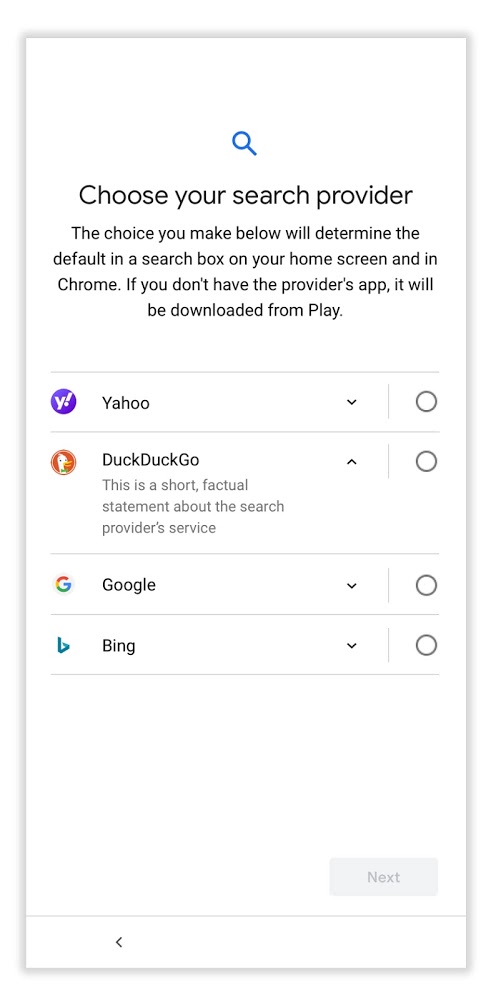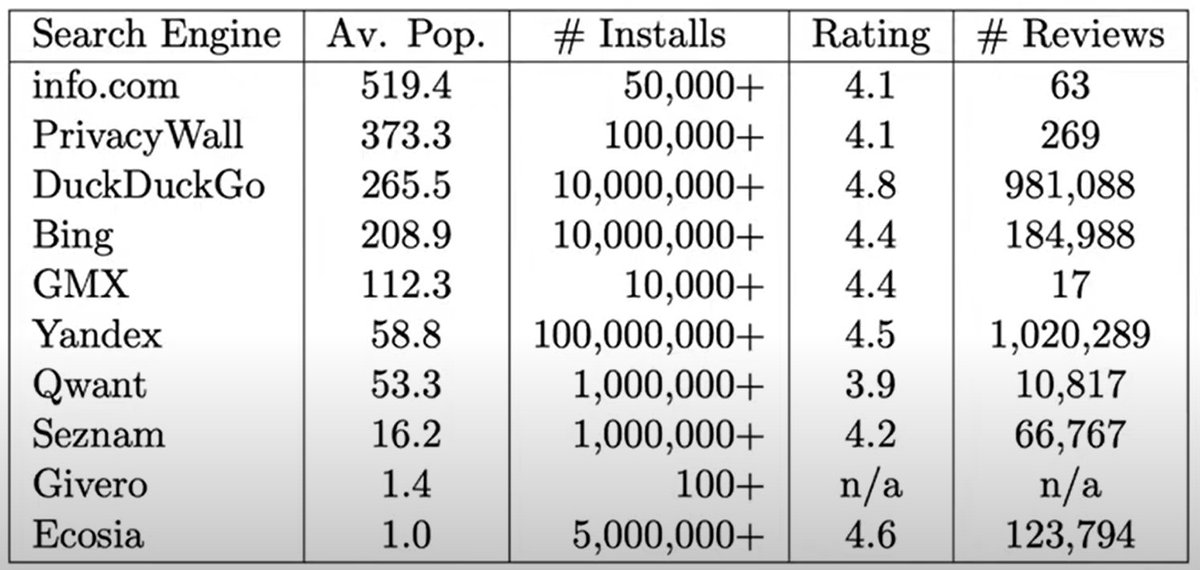Google reached a deal with EU regulators where they show Android users a screen like this, allowing people to select their default search engine. It's been an unmitigated disaster:
A recent paper by Michael Ostrovsky shows that the two search engines that have appeared the most on that screen are info.com and PrivacyWall, which are almost never actually installed.
http://web.stanford.edu/~ost/papers/csa.pdf
http://web.stanford.edu/~ost/papers/csa.pdf
Why? Well, first of all, Google set this up as an auction, where search engines pay them money to appear. So non-profit search engines like Ecosia or lower revenue search engines like DuckDuckGo are disadvantaged already.
But still, DuckDuckGo is a big player, while info.com is basically adware. Why is DuckDuckGo losing out? (Av. Pop. is the population of countries in which a given search engine has been on their "choice screen" since Google started this.)
Ostrovsky points out that the auction is structured so that you pay per *install,* and the search engines that are willing to pay the most per installation get shown to everyone on the choice screen (as well as Google, of course.)
What does this mean? Well if you create a search engine with a bunch of ads and really low quality, almost no one is going to choose it, but you'll make a lot of revenue off of the few users who do install it.
So if you pay per install, it makes sense to bid a lot of you're a scammy search engine like info.com, and less if you're a search engine with fewer ads like DuckDuckGo. DuckDuckGo has basically quit bidding in the last two rounds of auctions.
And if no one installs the options like info.com and PrivacyWall, what do they choose instead? Well Google, of course.
This is just so sinister.
This is just so sinister.
Google has to have known that this would favor unpopular search engines.
Ostrovsky suggests fixing this by doing a "per-appearance auction," where search engines pay to show up as an option whether or not they are selected.
I'm more with @lutherlowe: this is just fundamentally flawed. https://twitter.com/lutherlowe/status/1268713578040832000?s=20
I'm more with @lutherlowe: this is just fundamentally flawed. https://twitter.com/lutherlowe/status/1268713578040832000?s=20
This auction is premised on the ideas that Google deserves to make money off of Android users' default search engine choice and that the search engines that are willing to pay more to be shown to users are more desirable.
Those are both insane!
Those are both insane!
With search engines, there's a direct tradeoff between letting paid advertisers influence your search results and delivering the best search results to the users.
Imagine Google with half the ads. It would provide better results, and make half as much money per user.
Imagine Google with half the ads. It would provide better results, and make half as much money per user.
Under perfect competition you get a search engine that accepts no money from advertisers to influence results and makes no revenue per user. (OK, there are hosting costs, but the variable costs here are really low.)
Sidenote: the NBER IO conference where I came across Ostrovsky's paper also featured a paper claiming advertising improves search results. This implies that advertisers understand users' preferences better than Google. I am incredibly skeptical of this.
https://papers.ssrn.com/sol3/papers.cfm?abstract_id=3441786
https://papers.ssrn.com/sol3/papers.cfm?abstract_id=3441786
Anyway, the regulatory remedy that makes the most sense to me is to just put the search engines with the most downloads from the Google Play Store in the last, say, 30 days on the "choice screen." That way a popular search engine with no revenue can compete.
@mostrovs is on Twitter! Would have tagged him if I'd known. Great paper calling attention to a wild outcome.
This is a good coda to the thread. The European Commission ignored the advice that it should design the remedy itself. https://twitter.com/Caffar3Cristina/status/1361658147635658756?s=20

 Read on Twitter
Read on Twitter



